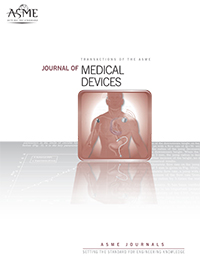Falls are the most common cause of injuries and the primary etiology for accidental deaths in the elderly population. The ability to quickly take a step is of paramount importance in maintaining balance. Previous research has shown a significant correlation between the time it takes to execute a step and the risk of experiencing a future fall. Consequently, a method that can quickly and accurately measure step behavior may be used to identify individuals with an increased risk of falling. The current project has built a prototype device that can be used in a clinical setting to easily and efficiently measure parameters of step execution. The step is performed under either single task (motor task only) or dual task conditions (motor task while performing an attention demanding cognitive task). Data can be stored in a relational data base and a clinical report that reflects fall risk can be printed. The current project is part of the Swedish PIEp initiative (Product Innovation Engineering Program), a federally and industry supported program that promotes innovation and technology commercialization in engineering education through development of innovation knowledge, experience and education including exchange of students and personnel between industry and academia on a national and international level.
Skip Nav Destination
Article navigation
Design Of Medical Devices Conference Abstracts
An Instrument to Predict Fall Risk—Project StepWiz
Mats Hanson,
Mats Hanson
Department of Mechatronics,
Royal Institute of Technology
, Stockholm, Sweden
Search for other works by this author on:
Lars Oddsson,
Lars Oddsson
Sister Kenny Research Center
, Minneapolis, MN, USA
Search for other works by this author on:
Mats Hanson
Department of Mechatronics,
Royal Institute of Technology
, Stockholm, Sweden
Lars Oddsson
Sister Kenny Research Center
, Minneapolis, MN, USAJ. Med. Devices. Jun 2008, 2(2): 027560 (1 pages)
Published Online: June 25, 2008
Article history
Published:
June 25, 2008
Citation
Hanson, M., Meymi, D., Nilsson, D., Oddsson, L., and Rockstr, R. (June 25, 2008). "An Instrument to Predict Fall Risk—Project StepWiz." ASME. J. Med. Devices. June 2008; 2(2): 027560. https://doi.org/10.1115/1.2936204
Download citation file:
584
Views
Get Email Alerts
Cited By
Development of an Anatomically Accurate Three-Dimensional Simulation Model for Pediatric Central Line Placement
J. Med. Devices (March 2024)
Related Articles
Special Issue: Annual Education Issue Writing a Review Article for Publication as Part of a Graduate Engineering Course
J Biomech Eng (August,2018)
Grip Force Variability and Its Effects on Children’s Handwriting Legibility, Form, and Strokes
J Biomech Eng (November,2010)
A New Approach to Teaching Biomechanics Through Active, Adaptive, and Experiential Learning
J Biomech Eng (July,2017)
An Analysis of the Effect of Lower Extremity Strength on Impact Severity During a Backward Fall
J Biomech Eng (December,2001)
Related Proceedings Papers
Related Chapters
Processing Free Form Objects within a Product Development Process Framework
Advances in Computers and Information in Engineering Research, Volume 1
Examples of content & competency-based Lean Engineering Education
Lean Engineering Education: Driving Content and Competency Mastery
Coordinating College-Wide Instructional Change through Faculty Communities
Advances in Multidisciplinary Engineering












